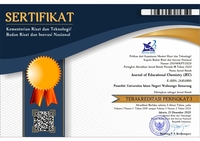Development of Computer Based Test Instrument for Higher Order Thinking Skills (CBT-HOTS) on Chemical Bonding Materials
DOI:
https://doi.org/10.21580/jec.2022.4.1.11709Keywords:
research and development, test instrument, computer-based, chemical bondingAbstract
This study aimed to produce a computer-based test instrument for higher-order thinking skills (CBT-HOTS) on the chemical bonding materials and to determine the higher-order thinking skills of students in Class X MIA at MAN Binjai Academic Year 2021/2022. This research employed the ADDIE model of Research and Development (R&D). The test instrument was created in the form of multiple-choice consisting of 30 questions measuring the cognitive domains of analyzing (C4), evaluating (C5), and creating (C6). Based on the findings, the developed instrument was declared feasible for use, considering that it had met the required content validity by expert assessments using the Aiken’s V index in the range of 0.97 to 1.00 and the reliability value of 0.93. The students' higher-order thinking skills on chemical bonding materials were included in the "high" category. It was shown from the percentages of answers to the HOTS questions in each involved domain; analyzing (C4) by 28%, evaluating (C5) by 44%, and creating (C6) by 28%. Additionally, the average score was 74.64, indicating that students' higher-order thinking skills were high.
Downloads
References
Arifin, Z. 2013. Evaluasi Pembelajaran. Bandung: Remaja Rosdakarya.
Arikunto, S. 2013. Dasar-dasar Evaluasi Pendidikan. Jakarta: Bumi Aksara.
Azmi, N. L., Sri Nurhayati, S. P., & Wardani, S. 2021. Pengembangan Instrumen Tes Untuk Mengukur HOTS Peserta Didik Pada Materi Laju Reaksi. Journal of Chemistry in Education, 10(1), 45-52.
Chaiyo, Y. 2017. The Effect of Kahoot, Quizizz and Google Forms On The Student Perception in the Classroom Response System. Thailand Journal Chiang Rai College, 5(1), 12-24.
Chaiyo, Y., & Nokham, R. 2017. The Effect of Kahoot, Quizizz and Google Forms on the Student's Perception in the Classrooms Response System. International Conference on Digital Arts, Media and Technology (ICDAMT), 178-182.
Fanani, M. Z. 2018. Strategi Pengembangan Soal Higher Order Thinking Skill (HOTS) dalam Kurikulum 2013. Jurnal Edudeena , 2(1), 60-70.
Hanifah, N. 2019. Pengembangan Instrumen Penilaian Higher Order Thinking Sill (HOTS) di Sekolah Dasar. Current Research in Education: Conference Series Journal , 1(1),1-12.
Iskandar, D. 2015. Studi Kemampuan Guru Kimia SMA Lulusan UNY dalam Mengembangkan Soal UAS Berbasis HOTS. Jurnal Inovasi Pendidikan IPA, 1(1), 66-77.
Kemendikbud. 2019. Modul Penyusunan Soal Keterampilan Berfikir Tingkat Tinggi (Higher Order Thingking Skill). Jakarta: Direktorat pembinaan SMA Direktorat Jendral Pendidikan Dasar dan Menengah.
Muchlis, I. P., & Andromeda. 2020. Pengembangan Instrumen Tes Berbasis Higher Order Thinking Skill Pada Materi Hidrolisis Garam Untuk Siswa SMA/MA. JEP (Jurnal Eksakta Pendidikan), 4(2), 218-225.
Mulianah, S., & Hidayat, W. 2013. Pengembangan Tes Berbasis Komputer. Kuriositas, 2(6), 27-43.
Netri, N., Holiwarni, B., & Abdullah. 2018. Development of Test Instruments Based Higher Order Thinking Skill (HOTS) on Chemical Equilibrium at Second Grade In Senior High School. JOM FKIP, 5(2), 1-11.
Rayanto, Y. H., & Sugianti. 2020. Penelitian Pengembangan Model ADDIE dan R2D2 dan Praktek. Pasuruan: Lembaga Academic & Researc Intitute.
Redhana, I. W. 2019. Mengembangkan Keterampilan Abad Ke-21 dalam Pembelajaran Kimia. Jurnal Inovasi Pendidikan Kimia, 13(1), 2239-2253.
Saputro, B. 2021. Best Practices Penelitian Pengembangan. Salatiga: Academia Publication.
Sarah, F., Khaldun, I., & Gani, A. 2021. The Development Higher Order Thinking Skill (HOTS) As Questions in Chemistry Study (Solubility and Solubility Product Constant). Jurnal Pendidikan Sains (JPS), 9(1), 51-60.
Silitonga, P. M. 2011. Statistika: Teori dan Aplikasi dalam Penelitian. Graha Ilmu: Yogyakarta.
Wadana, I. W. 2017. Modul penyususna soal Higher Order Thinking Skill (HOTS). Jakarta: Departemen Pendidikan dan Kebudayaan.
Widihastuti & Suyata. 2014. Model AFL untuk Meningkatkan Pemahaman dan Higher Order Thinking Skills Mahasiswa Vokasi Bidang Busana. Jurnal Penelitian dan Evaluasi Pendidikan, 18(2), 275-289.
Downloads
Published
How to Cite
Issue
Section
License
The copyright of the received article shall be assigned to the journal as the publisher of the journal. The intended copyright includes the right to publish the article in various forms (including reprints). The journal maintains the publishing rights to the published articles.
Authors are permitted to disseminate published articles by sharing the link/DOI of the article at the journal. Authors are allowed to use their articles for any legal purposes deemed necessary without written permission from the journal with an acknowledgment of initial publication to this journal.

This work is licensed under a Creative Commons Attribution-NonCommercial-ShareAlike 4.0 International License.


